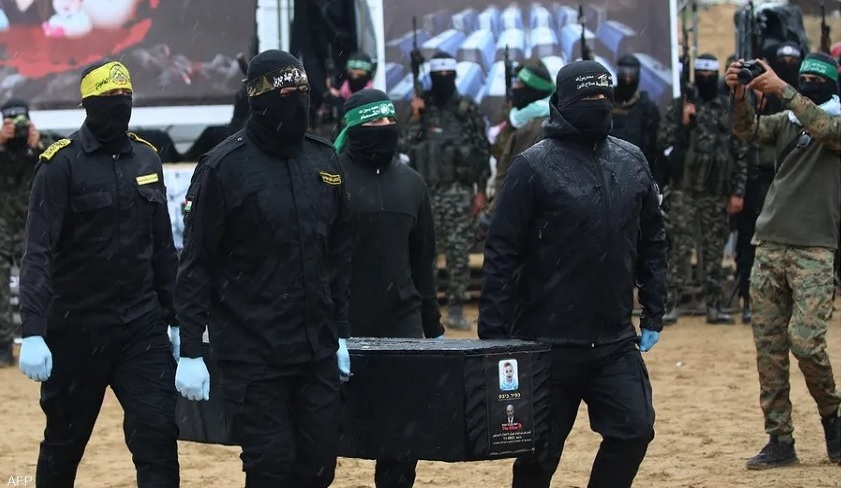Alwaght- While Gaza ceasefire has stuck in its first stage, the Israelis are struggling to destroy all of the ceasefire agreements. On Tuesday, the Israeli Prime Minister Benjamin Netanyahu ordered "powerful attacks" on Gaza, ignoring the truce.
The order came hours after Israeli army claimed that Hamas forces opened fire at its units stationed in southern Gaza. The PM's office statement said that after security consultations, Netanyahu instructed the military to immediately launch heavy-handed attacks on the coastal enclave.
Netanyahu has claimed that the renewed airstrikes are a response to Hamas's failure to hand over the bodies of captured Israelis. However, Hamas states it remains committed to returning the remains of killed prisoners, citing significant logistical hurdles. The resistance movement reports that while it has already returned 18 of the 28 deceased prisoners, the remaining 10 bodies are trapped beneath the rubble of ruined buildings. Hamas officials say recovering them requires heavy machinery they lack.
The key obstacle, according to Hamas and observers in Gaza, is the ongoing Israeli blockade, which prevents the import of the advanced equipment needed for the recovery efforts. Despite this, Hamas has expressed readiness to cooperate with forensic experts to locate the remaining bodies.
It seems that continuation of blockade and limiting entry of equipment and machinery for excavation in Gaza is the main reason behind delay of bodies handover. However, accusing Hamas of procrastination, the Israelis are escaping forward from acting on their obligations under the deal. In other words, by restricting aid entry to Gaza, Tel Aviv has been the main party to violate the truce agreement and so the delay in handover of the bodies is an outcome of ongoing blockade.
Gaza officials, eyewitnesses, and Hamas-affiliated media outlets said that in the rejuvenated airstrikes a residential building next to Shafa Hospital was struck in northern Gaza. Meanwhile, the search to recover the bodies has been stepped up in the recent days. Bulldozers in Khan Younis in southern Gaza and in Al-Nusairat Camp in the north are working amid intensive presence of Hamas fighters, but a number of the bodies is still under hundreds of tons of rubles caused by Israeli air raids.
Trying to bring ceasefire to collapse
It should be noted that Netanyahu's order to bomb Gaza explicitly overturns the ceasefire. Simultaneously, Hamas released a statement emphasizing its commitment to the truce's terms and accused Netanyahu of looking for excuses to shirk Israel's own ceasefire obligations. Hamas also announced that due to the Israeli attacks, it has postponed the planned return of one Israeli hostage's remains.
Some experts say that pressure from hardline factions in Netanyahu's cabinet to break the ceasefire and resume the war in Gaza was a key factor in his decision to order the bombing. The truce was established at a time when the Israeli regime had failed to achieve any of its war objectives. Hamas still holds power in Gaza, and by the admission of Israel's Channel 14, over 70 percent of the tunnels in Gaza remain intact. Hamas is rebuilding its power by recruiting new members and recycling unexploded ordnance from the two-year war.
For Israeli officials, Hamas's resurgence since the ceasefire is a nightmare, demonstrating that two years of war failed to achieve the goal of destroying the group. Consequently, Israeli officials are now trying to sabotage the truce and restart the war.
In recent hours, Israeli warplanes have bombed Gaza from north to south, leading to the deaths of at least 18 Palestinians and injuring dozens of others. These airstrikes came after Hamas denied any involvement in what the Israelis described as gunfire in the southern city of Rafah. Netanyahu, in turn, has cited the clashes in Rafah as the justification for his deadly aerial attacks.
Dispute inside Israeli cabinet over ceasefire
Reports suggest that Netanyahu's cabinet is clashing over if it should stay committed to the truce or resume war. Channel 12, citing a senior Israeli official, reported that the Tuesday meeting of Netanyahu with his cabinet members ended without any decision on war.
The channel reported that senior military officials, whom Netanyahu met in a cabinet session, presented the PM with a broad spectrum of military options, including a resumption of attacks on Gaza. However, Netanyahu concluded the meeting by stating that any potential course of action would require necessary coordination with the Americans. It is unlikely that the Trump administration would permit Netanyahu to outright scrap the Gaza ceasefire agreement, as Trump has heavily invested in the truce and has personally tied his name to it. Nevertheless, it is likely that Netanyahu could attempt to ease the push for war from his cabinet hardliners by authorizing limited, periodic airstrikes against Gaza, implementing a Lebanon model.



























